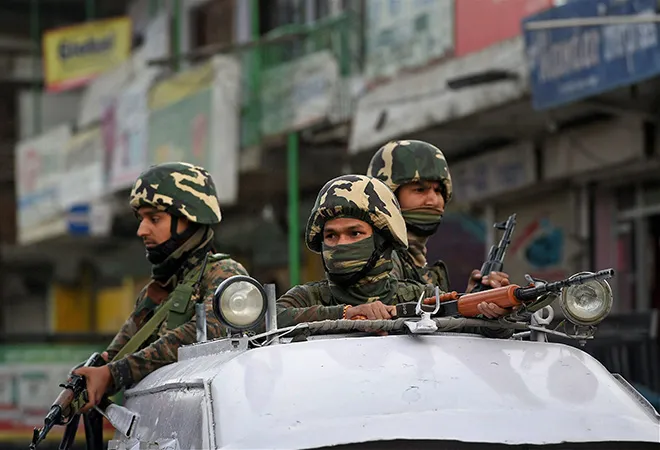Ending the dilemma over the fate of security operations against militants in Jammu and Kashmir, the Centre has decided against extending the ceasefire imposed during Ramzan. The ceasefire has seen a marked increase of violence in the state, capped by the assassination of journalist Shujaat Bukhari. By not initiating operations, the security forces have allowed the initiative to shift to the militants.
Militancy recruits
The ceasefire issue, however, is relatively minor compared to the larger one which requires a strategy to deal with the changing nature of the militancy. This has seen an escalation of local recruitment which has outpaced the numbers the security forces have been able to neutralise.
These new recruits are young and impressionable men who get caught up in the emotion of the moment, usually an encounter or the funeral of a militant. The authorities are also hard put to deal with the mass participation in violent civil protest involving stone pelting often at the site of an encounter or a funeral. Many of the young, who join militancy this way, don’t survive for too long. They are not trained and their weapons are often those that are snatched from security forces.
There is another category of militants — the Pakistanis, who usually lie low and conduct planned hits, either on security forces or targeted killings of individuals like Bukhari.
The government will, no doubt, be tempted to double down on Operation All Out and try and physically liquidate the militants. Killing the untrained Valley recruits will hardly pose a problem. The Pakistanis, on the other hand, are more seasoned and have the ability to ride out any campaign.
The Army and the security machinery in general, too, need to understand that oft-stated principle, that the key to winning a counter-insurgency conflict is a balanced policy of carrots and sticks. A 2010 RAND study of 30 counter-insurgency campaigns in the world showed that only eight succeeded.
It noted that repression and punishment provided only temporary relief. But it did point to something that is very important for us: material support from neighbouring countries makes a vital difference in the success or failure of a counter-insurgency campaign. Dealing with Pakistan is not a luxury, it is a necessity.
There is another self-created problem here – the Modi era conflation of militancy with terrorism. This may have played well with Modi loyalists, but it has boxed in the government itself. Atal Bihari Vajpayee was able to negotiate with militants in 2000, just as Modi himself is with the Naga insurgents, but you cannot talk to terrorists.
Stone pelting
The government would even now be advised to look at this issue of better ways of dealing with violent civil protest aka stone pelting. Standard operating procedures must require the use of lethal force only when there is an imminent threat to life and property, force should be used proportionately and not as a punitive measure. The challenge is to tire out the mob, not physically decimate it.
Riot police around the world deal with mobs, some of who toss stones and Molotov cocktails at them. Dealing with such challenges requires much greater concentrations of the police at given locations, provision of protective gear, training and conditioning. If the police personnel are too few or ill-equipped, it only adds to the problem when the security forces feel threatened and open fire to protect themselves.
British lesson
In his study, "The Changing Face of War", the Israeli military historian Martin van Creveld analysed several counter-insurgency campaigns. He concluded that an approach taken by the British in Northern Ireland is perhaps the best. This strategy involved operating within the framework of law, avoiding torture, illegal killing and arbitrary punishment. Though there were excesses, by and large the British stuck to the policy that has led to sustainable peace in the region.
Van Creveld has sharply criticised the tactics of the Israeli defence forces which has some admirers in India these days. The IDF killed hundreds, arrested thousands, blew up houses of many suspect terrorists, broke arms and legs of protestors in the first intifada in the late 1980s. But we know that peace has not been achieved in the region.
The Israelis are dealing with an alien people, in J&K we must deal with our own nationals and, therefore, it is that much more obligatory on our part to conduct operations within the ambit of the law and through the use of discriminate and proportionate force.
Practical necessity obliges us to ensure that this is synchronised with an approach to persuade Pakistan to stop support to the militancy. None of this can be done overnight, but we must have a strategic plan and work along it.
This commentary originally appeared in DailyO.
The views expressed above belong to the author(s). ORF research and analyses now available on Telegram! Click here to access our curated content — blogs, longforms and interviews.




 PREV
PREV


